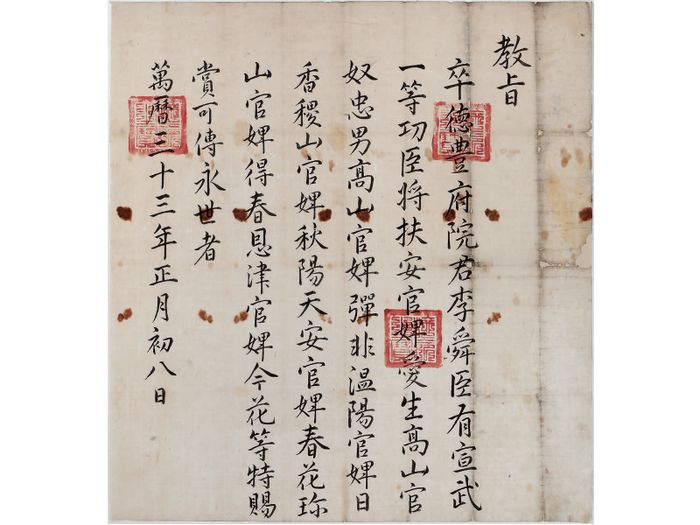"(Translation) 宣武功臣李舜臣賜牌"의 두 판 사이의 차이
| 61번째 줄: | 61번째 줄: | ||
# What circumstances in the early 17th century led the King to make such a command? | # What circumstances in the early 17th century led the King to make such a command? | ||
# Why do you think the slaves awarded were from diverse places? | # Why do you think the slaves awarded were from diverse places? | ||
| + | <!-- | ||
| + | =='''Further Readings'''== | ||
| − | |||
| − | |||
<div style="color:#008080;"> | <div style="color:#008080;"> | ||
* View together with '''~~'''. | * View together with '''~~'''. | ||
</div> | </div> | ||
| − | + | ||
* | * | ||
* | * | ||
| 172번째 줄: | 172번째 줄: | ||
[[Category:2018 Hanmun Summer Workshop]] | [[Category:2018 Hanmun Summer Workshop]] | ||
[[Category:Advanced Translation Group]] | [[Category:Advanced Translation Group]] | ||
| + | --> | ||
2022년 2월 14일 (월) 23:35 기준 최신판
| Primary Source | ||
|---|---|---|
 |
Title | |
| English | ||
| Chinese | 宣武功臣 李舜臣 賜牌 | |
| Korean(RR) | ||
| Text Details | ||
| Genre | Royal Documents | |
| Type | ||
| Author(s) | ||
| Year | 1605 | |
| Source | ||
| Key Concepts | ||
| Translation Info | ||
| Translator(s) | Participants of 2018 Summer Hanmun Workshop (Advanced Translation Group) | |
| Editor(s) | ||
| Year | 2018 | |
Introduction
1605年(宣祖 38) 宣武功臣 1等에 錄勳된 李舜臣(1545~1598)에게 發給된 賜牌이다. 李舜臣은 本貫이 德水이고, 李貞의 아들이다. 壬辰倭亂 中에 全羅左道 水軍節度使, 三道水軍 統制使 等의 職任을 맡아 戰場에서 赫赫한 功을 세웠고, 1598年(宣祖 31) 露梁海域에서 벌어진 戰鬪에서 殉國하였다. 壬辰倭亂이 끝난 뒤 宣祖는 1604年(宣祖 37) 6月 25日에 李舜臣을 效忠仗義迪毅協力宣武功臣 1等으로 冊封하였다. 當時 伴倘 10人, 奴婢 13口, 丘史 7名, 田地 150結, 銀子 10兩, 內廏馬 1匹을 賜給하도록 하였으나, 戰亂 直後 國家의 財政이 넉넉하지 못하여 賜給하지 못하다가 이듬해인 1605年 正月에야 비로소 全羅道 扶安과 高山, 忠淸道 溫陽과 天安 等地의 官奴婢 8名을 賜給하기에 이르렀다. 이때 發給한 賜牌가 바로 이 文書이다.
以後에도 처음에 明示한 奴婢 13口 中 나머지 5口를 한참 後까지 賜給하지 못하다가 1653年(孝宗 4)에 이르러 賜給하게 되는데, 이때 發給된 賜牌도 現在까지 남아 있다. 『經國大典』의 賜牌式을 準用하여 作成되었으나, 賜牌 發給 當時 李舜臣이 이미 故人이었으므로 ‘卒’을 姓名 앞에 附記하였다. 文書에 使用된 寶印은 ‘施命之寶’이다.
Original Script
| Classical Chinese | English |
|---|---|
|
宣武功臣李舜臣賜牌 (01) 敎旨 (02) 卒德豊府院君李舜臣, 有宣武 (03) 一等功臣, 將扶安官婢愛生·高山官 (04) 奴忠男·高山官婢彈非·溫陽官婢日 (05) 香·稷山官婢秋陽·天安官婢春花·珍 (06) 山官婢得春·恩律官婢今畵等, 特賜 (07) 賞, 可傳永世者. (08) 萬曆三十三年 正月 初八日. [施命之寶] 3顆 |
Royal Warrant for Yi Sunsin(1545-1598), the Meritorious Minister of Promoting Martiality The King orders that Yi Sunsin, the late Great Lord of Tŏkp'ung, the first-rate meritorious minister of promoting martiality, be specially awarded Aesaeng, the female government slave of Puan; Ch'ungnam, the male government slave of Kosan; Tanbi, the female government slave of Kosan; Irhyang, the female government slave of Kosan; Ch'uyang, the female government slave of Chiksan; Ch'unhwa, the female government slave of Ch'eon'an; Tŭkch'un, the female government slave of Chinsan; Kŭmhwa, the female government slave, and others, for perpetual inheritance to his descendants. The eighth day of the first month in the thirty-third year (1605) of Emperor Wanli's Reign (1673-1620). Three Seals on the document: The Treasure of Issuing the (Royal) Command |
Discussion Questions
- What circumstances in the early 17th century led the King to make such a command?
- Why do you think the slaves awarded were from diverse places?